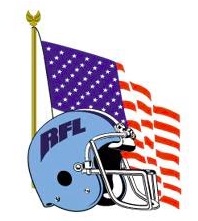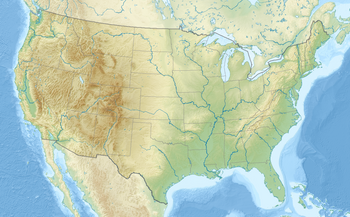Raymond 'Ray' Philyaw is a former arena football quarterback who was most recently the offensive coordinator of the Jacksonville Sharks of the Arena Football League (AFL). He also played for the Cleveland Gladiators, Chicago Rush, Kansas City Brigade, Bossier-Shreveport Battle Wings and the Albany/Indiana Firebirds, leading the former to the American Conference championship game in 2004 and 2005. Prior to his Arena Football career, he played for the Winnipeg Blue Bombers of the Canadian Football League (CFL) and the Madison Mad Dogs of the Indoor Football League (IFL). After leaving to coach with the New Orleans VooDoo in 2011, he attempted a return as a player in 2012 with the San Jose SaberCats, but later became OC for the San Antonio Talons. He holds the record for the highest career TD-to-INT ratio in AFL history and threw a school record 52 TDs while attending Northeast Louisiana.
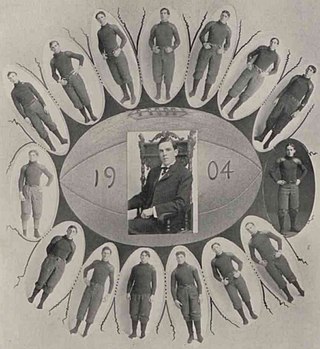
The 1904 LSU Tigers football team represented Louisiana State University (LSU) as a member of the Southern Intercollegiate Athletic Association (SIAA) during the 1904 college football season. Led by first-year head coach Dan A. Killian, the Tigers compiled an overall record of 3–4, with a mark of 1–2 in conference play.

The New Orleans Thunder were a professional American football team that played during the 1999 season as part of the Regional Football League. They played their home games at Tad Gormley Stadium in City Park in New Orleans.
Paul Buford Jordan is a former professional American football running back in the National Football League (NFL) for the New Orleans Saints.
Nicky John Savoie is an American former professional football tight end who played during one season in the National Football League (NFL) with the New Orleans Saints.

Ralph Allon "Catfish" Smith Sr. was an American professional football player who was an end in the National Football League (NFL). He played eight seasons, for the Philadelphia Eagles (1962–1964), Cleveland Browns (1965–1968), and the Atlanta Falcons (1969). He was drafted out of Ole Miss by the Eagles in 1962 and also had a stint with the New Orleans Saints.
Marquette Smith is a former American football running back. Mostly known for his prep and college career, he spent two seasons with the Carolina Panthers of the National Football League (NFL), but knee injuries in successive years during the pre-season kept him off the field.
The Mississippi Fire Dogs were a professional indoor American football team based in Biloxi, Mississippi. They played their home games at the Mississippi Coast Coliseum. They were a charter member of the Indoor Professional Football League. They played from in the 1999-2000 IPFL seasons before joining the National Indoor Football League in 2001. Their final season was in 2002.
Alfonso Teddy Garcia is an American former professional football player who was a placekicker in the National Football League (NFL) and the World League of American Football (WLAF).
The 1913 LSU Tigers football team represented the LSU Tigers of Louisiana State University during the 1913 Southern Intercollegiate Athletic Association football season. The team was captained by center Tom Dutton. At guards were T. R. Mobley and Arthur Klock. In the backfield was quarterback Lawrence Dupont and fullback Alf Reid. Dupont had 15 touchdowns in 1913, four of them coming on November 22 in a game against rival Tulane in a 40–0 victory.
Dameian Jeffries is an American former professional football defensive end. He played college football for Alabama before being selected by the New Orleans Saints in the fourth round of the 1995 NFL draft. He appeared in two games for the Saints in 1995. Jeffries later played for the Mobile Admirals in the short-lived Regional Football League (RFL) in 1999.
The 1941 LSU Tigers football team was an American football team that represented Louisiana State University (LSU) in the Southeastern Conference (SEC) during the 1941 college football season. In their seventh season under head coach Bernie Moore, the Tigers compiled a 4–4–2 record, finished seventh in the conference, and outscored opponents by a total of 119 to 93.
Jason Martin is a former American football quarterback who played two seasons with the Grand Rapids Rampage of the Arena Football League. He played college football at Louisiana Tech University. He was also a member of the Barcelona Dragons of NFL Europe in 1998, and the Shreveport Knights of the short-lived Regional Football League in 1999.
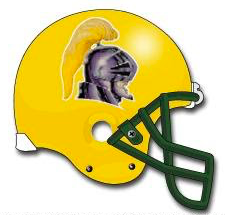
The Shreveport Knights were a professional American football team that played during the 1999 season as part of the Regional Football League. They played their home games at Independence Stadium in Shreveport, Louisiana.
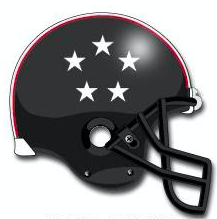
The Mobile Admirals were a professional American football team that played during the 1999 season as part of the Regional Football League; the Admirals were the league champions. They played their home games at Ladd–Peebles Stadium in Mobile, Alabama.

The Mississippi Pride were a professional American football team that played during the 1999 season as part of the Regional Football League. They played their home games at Mississippi Veterans Memorial Stadium in Jackson, Mississippi.

The Ohio Cannon, also known as the Toledo Cannon, was a professional American football team that played during the 1999 season as part of the Regional Football League. They played their home games at the Glass Bowl in Toledo, Ohio.

The Houston Outlaws were a professional American football team that played during the 1999 season as part of the Regional Football League. They played their home games at Pasadena Memorial Stadium in Pasadena, Texas, a suburb of Houston.
The 1904 Louisiana Industrial football team was an American football team that represented the Louisiana Industrial Institute—now known as Louisiana Tech University—as an independent during the 1904 college football season. In their first and only season under head coach E. G. Pierce, Louisiana Industrial compiled a 1–4 record. The team's captain was Glenn M. Walker.
The 1910 Louisiana Industrial football team was an American football team that represented the Louisiana Industrial Institute—now known as Louisiana Tech University—as an independent during the 1910 college football season. Led by second-year head coach Percy S. Prince, Louisiana Industrial compiled a record of 7–0.
